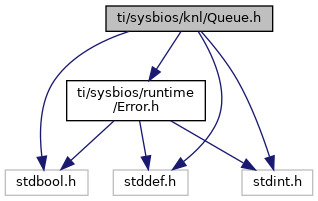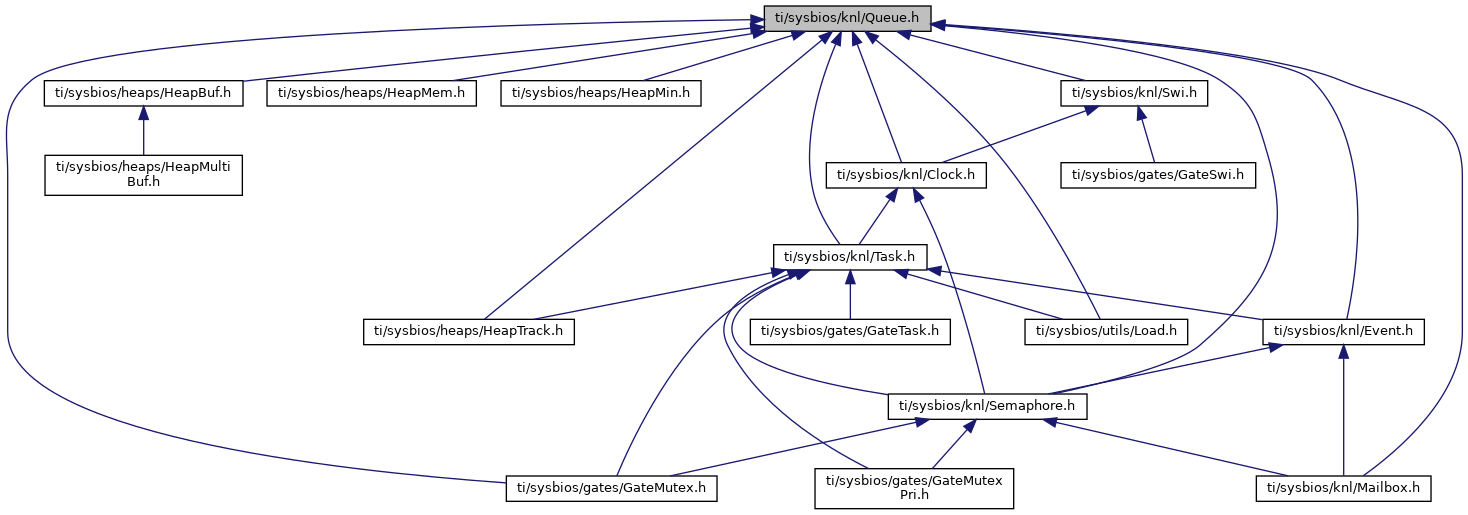

 |
 |
|
SYS/BIOS
7.00
|
Queue Manager.
The Queue module makes available a set of functions that manipulate queue objects accessed through handles of type Queue_Handle. Each queue contains a linked sequence of zero or more elements referenced through variables of type Queue_Elem, which are embedded as the first field within a structure.
In the Queue API descriptions, the APIs which disable interrupts before modifying the Queue are noted as "atomic", while APIs that do not disable interrupts are "non-atomic".
Queues are represented as doubly-linked lists, so calls to Queue_next or Queue_prev can loop continuously over the Queue. The following code demonstrates one way to iterate over a Queue once from beginning to end. In this example, 'myQ' is a Queue_Handle.
Below is a simple example of how to create a Queue, enqueue two elements, and dequeue the elements until the queue is empty:
Unconstrained Functions All functions are unconstrained
| Function | Hwi | Swi | Task | Main | Startup |
|---|---|---|---|---|---|
| Queue_create | N | N | Y | Y | N |
| Queue_insert | Y | Y | Y | Y | N |
| Queue_next | Y | Y | Y | Y | N |
| Queue_Params_init | Y | Y | Y | Y | N |
| Queue_prev | Y | Y | Y | Y | N |
| Queue_remove | Y | Y | Y | Y | N |
| Queue_construct | Y | Y | Y | Y | N |
| Queue_delete | N | N | Y | Y | N |
| Queue_dequeue | Y | Y | Y | Y | N |
| Queue_destruct | Y | Y | Y | Y | N |
| Queue_empty | Y | Y | Y | Y | N |
| Queue_enqueue | Y | Y | Y | Y | N |
| Queue_get | Y | Y | Y | Y | N |
| Queue_head | Y | Y | Y | Y | N |
| Queue_put | Y | Y | Y | Y | N |
Definitions:
| |||||


Go to the source code of this file.
Data Structures | |
| struct | Queue_Elem |
| Opaque queue element. More... | |
| struct | Queue_Params |
Typedefs | |
| typedef struct Queue_Elem | Queue_Elem |
| Opaque queue element. More... | |
| typedef Queue_Elem | Queue_Struct |
| typedef Queue_Struct | Queue_Object |
| typedef Queue_Struct * | Queue_Handle |
Functions | |
| Queue_Handle | Queue_create (const Queue_Params *prms, Error_Block *eb) |
| Create a Queue object. More... | |
| Queue_Handle | Queue_construct (Queue_Struct *obj, const Queue_Params *prms) |
| Construct a queue. More... | |
| void | Queue_delete (Queue_Handle *queue) |
| Delete a queue. More... | |
| void | Queue_destruct (Queue_Struct *obj) |
| Destruct a queue. More... | |
| void | Queue_Params_init (Queue_Params *prms) |
| Initialize the Queue_Params structure with default values. More... | |
| void | Queue_insert (Queue_Elem *qelem, Queue_Elem *elem) |
Insert elem in the queue in front of qelem. More... | |
| void * | Queue_next (Queue_Elem *qelem) |
| Return next element in queue (non-atomically). More... | |
| void * | Queue_prev (Queue_Elem *qelem) |
| Return previous element in queue (non-atomically). More... | |
| void | Queue_remove (Queue_Elem *qelem) |
| Remove qelem from middle of queue (non-atomically). More... | |
| void * | Queue_dequeue (Queue_Handle queue) |
| Remove the element from the front of queue and return elem (non- atomically). More... | |
| bool | Queue_empty (Queue_Handle queue) |
| Test for an empty queue. More... | |
| void | Queue_enqueue (Queue_Handle queue, Queue_Elem *elem) |
| Insert at end of queue (non-atomically). More... | |
| void * | Queue_get (Queue_Handle queue) |
| Get element from front of queue (atomically). More... | |
| void * | Queue_getTail (Queue_Handle queue) |
| Get the element at the end of the queue (atomically). More... | |
| void * | Queue_head (Queue_Handle queue) |
| Return element at front of queue. (atomically) More... | |
| void | Queue_put (Queue_Handle queue, Queue_Elem *elem) |
| Put element at end of queue (atomically). More... | |
| void | Queue_putHead (Queue_Handle queue, Queue_Elem *elem) |
| Put element at the front of the queue (atomically). More... | |
| typedef struct Queue_Elem Queue_Elem |
Opaque queue element.
A field of this type is placed at the head of client structs.
| typedef Queue_Elem Queue_Struct |
| typedef Queue_Struct Queue_Object |
| typedef Queue_Struct* Queue_Handle |
| Queue_Handle Queue_create | ( | const Queue_Params * | prms, |
| Error_Block * | eb | ||
| ) |
Create a Queue object.
This function creates a new Queue object.
| prms | queue parameters |
| eb | error block |
| Queue | handle (NULL on failure) |
| Queue_Handle Queue_construct | ( | Queue_Struct * | obj, |
| const Queue_Params * | prms | ||
| ) |
Construct a queue.
Queue_construct is equivalent to Queue_create except that the Queue_Struct is pre-allocated. See Queue_create() for a description of this API.
| obj | pointer to a Queue object |
| prms | queue parameters |
| Queue | handle (NULL on failure) |
| void Queue_delete | ( | Queue_Handle * | queue | ) |
Delete a queue.
Queue_delete deletes a Queue object. Note that Queue_delete takes a pointer to a Queue_Handle which enables Queue_delete to set the Queue_handle to NULL.
| queue | pointer to Task handle |
| void Queue_destruct | ( | Queue_Struct * | obj | ) |
Destruct a queue.
Queue_destruct destructs a Queue object.
| obj | pointer to Queue object |
| void Queue_Params_init | ( | Queue_Params * | prms | ) |
Initialize the Queue_Params structure with default values.
Queue_Params_init initializes the Queue_Params structure with default values. Queue_Params_init should always be called before setting individual parameter fields. This allows new fields to be added in the future with compatible defaults – existing source code does not need to change when new fields are added.
| prms | pointer to uninitialized params structure |
| void Queue_insert | ( | Queue_Elem * | qelem, |
| Queue_Elem * | elem | ||
| ) |
Insert elem in the queue in front of qelem.
| qelem | element already in queue |
| elem | element to be inserted in queue |
| void* Queue_next | ( | Queue_Elem * | qelem | ) |
Return next element in queue (non-atomically).
This function returns a pointer to an Elem object in the queue after qelem. A Queue is represented internally as a doubly-linked list, so 'next' can be called in a continuous loop over the queue. See the module description for an example of iterating once over a Queue.
| qelem | element in queue |
| next | element in queue |
| void* Queue_prev | ( | Queue_Elem * | qelem | ) |
Return previous element in queue (non-atomically).
This function returns a pointer to an Elem object in the queue before qelem. A Queue is represented internally as a doubly-linked list, so 'prev' can be called in a continuous loop over the queue. See the module description for an example of iterating once over a Queue.
| qelem | element in queue |
| previous | element in queue |
| void Queue_remove | ( | Queue_Elem * | qelem | ) |
Remove qelem from middle of queue (non-atomically).
The qelem parameter is a pointer to an existing element to be removed from the Queue.
| qelem | element in queue |
| void* Queue_dequeue | ( | Queue_Handle | queue | ) |
Remove the element from the front of queue and return elem (non- atomically).
This function removes an element from the front of a queue and returns it.
If called with an empty queue, this function will return a pointer to the queue itself.
| queue | Queue handle |
| pointer | to former first element |
| bool Queue_empty | ( | Queue_Handle | queue | ) |
Test for an empty queue.
| queue | Queue handle |
| true | if this queue is empty |
| void Queue_enqueue | ( | Queue_Handle | queue, |
| Queue_Elem * | elem | ||
| ) |
Insert at end of queue (non-atomically).
| queue | Queue handle |
| elem | pointer to an element |
| void* Queue_get | ( | Queue_Handle | queue | ) |
Get element from front of queue (atomically).
This function removes an element from the front of a queue and returns it.
If called with an empty queue, this function will return a pointer to the queue itself. This provides a means for using a single atomic action to check if a queue is empty, and to remove and return the first element if it is not empty:
| queue | Queue handle |
| pointer | to former first element |
| void* Queue_getTail | ( | Queue_Handle | queue | ) |
Get the element at the end of the queue (atomically).
This function removes the element at the end of a queue and returns a pointer to it. If called with an empty queue, this function will return a pointer to the queue itself. This provides a means for using a single atomic action to check if a queue is empty, and to remove and return the last element if it is not empty:
| queue | Queue handle |
| pointer | to former end element |
| void* Queue_head | ( | Queue_Handle | queue | ) |
Return element at front of queue. (atomically)
This function returns a pointer to the element at the front of a queue. The element is not removed from the queue. If called with an empty queue, this function will return a pointer to the queue itself. This provides a means for using a single atomic action to check if a queue is empty, and to return a pointer to the first element if it is not empty:
| queue | Queue handle |
| pointer | to first element |
| void Queue_put | ( | Queue_Handle | queue, |
| Queue_Elem * | elem | ||
| ) |
Put element at end of queue (atomically).
| queue | Queue handle |
| elem | pointer to new queue element |
| void Queue_putHead | ( | Queue_Handle | queue, |
| Queue_Elem * | elem | ||
| ) |
Put element at the front of the queue (atomically).
| queue | Queue handle |
| elem | pointer to new queue element |